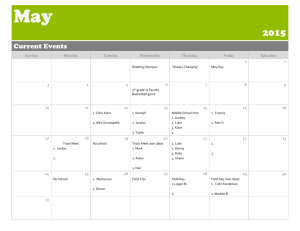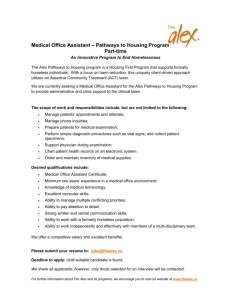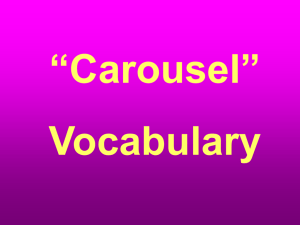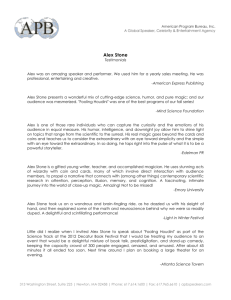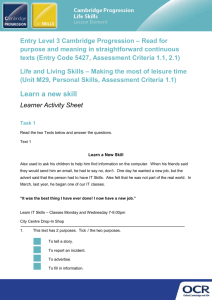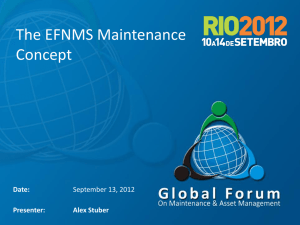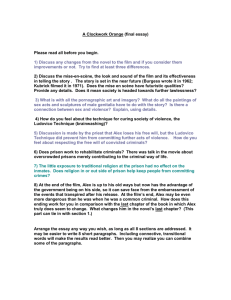Final Tutoring Reflection
advertisement
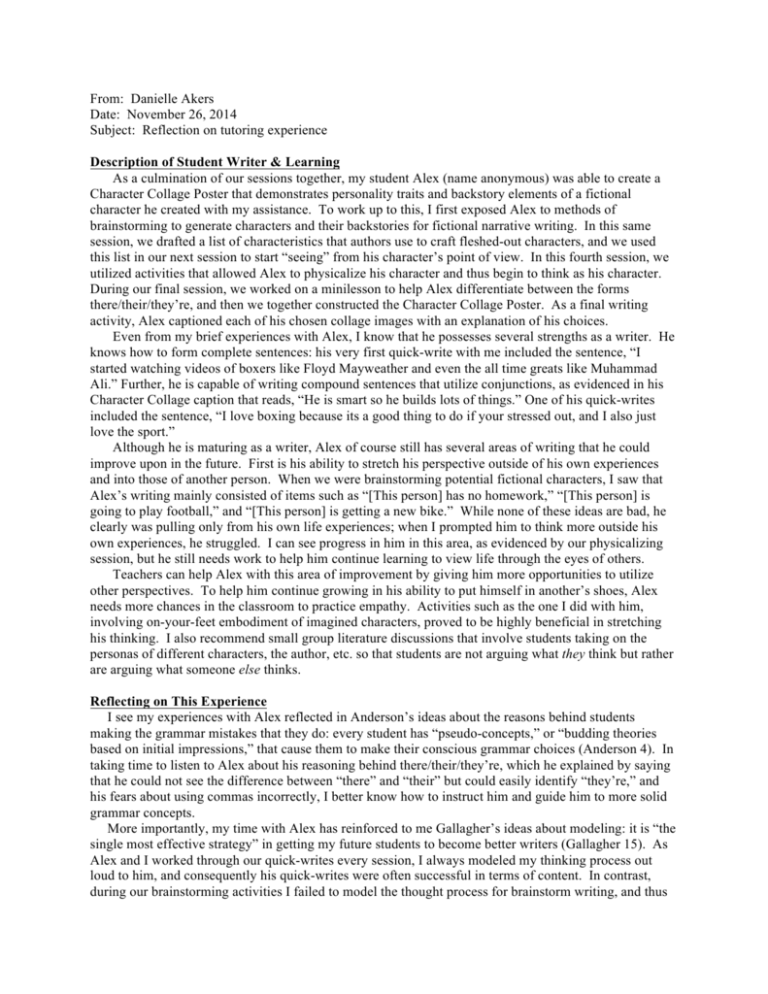
From: Danielle Akers Date: November 26, 2014 Subject: Reflection on tutoring experience Description of Student Writer & Learning As a culmination of our sessions together, my student Alex (name anonymous) was able to create a Character Collage Poster that demonstrates personality traits and backstory elements of a fictional character he created with my assistance. To work up to this, I first exposed Alex to methods of brainstorming to generate characters and their backstories for fictional narrative writing. In this same session, we drafted a list of characteristics that authors use to craft fleshed-out characters, and we used this list in our next session to start “seeing” from his character’s point of view. In this fourth session, we utilized activities that allowed Alex to physicalize his character and thus begin to think as his character. During our final session, we worked on a minilesson to help Alex differentiate between the forms there/their/they’re, and then we together constructed the Character Collage Poster. As a final writing activity, Alex captioned each of his chosen collage images with an explanation of his choices. Even from my brief experiences with Alex, I know that he possesses several strengths as a writer. He knows how to form complete sentences: his very first quick-write with me included the sentence, “I started watching videos of boxers like Floyd Mayweather and even the all time greats like Muhammad Ali.” Further, he is capable of writing compound sentences that utilize conjunctions, as evidenced in his Character Collage caption that reads, “He is smart so he builds lots of things.” One of his quick-writes included the sentence, “I love boxing because its a good thing to do if your stressed out, and I also just love the sport.” Although he is maturing as a writer, Alex of course still has several areas of writing that he could improve upon in the future. First is his ability to stretch his perspective outside of his own experiences and into those of another person. When we were brainstorming potential fictional characters, I saw that Alex’s writing mainly consisted of items such as “[This person] has no homework,” “[This person] is going to play football,” and “[This person] is getting a new bike.” While none of these ideas are bad, he clearly was pulling only from his own life experiences; when I prompted him to think more outside his own experiences, he struggled. I can see progress in him in this area, as evidenced by our physicalizing session, but he still needs work to help him continue learning to view life through the eyes of others. Teachers can help Alex with this area of improvement by giving him more opportunities to utilize other perspectives. To help him continue growing in his ability to put himself in another’s shoes, Alex needs more chances in the classroom to practice empathy. Activities such as the one I did with him, involving on-your-feet embodiment of imagined characters, proved to be highly beneficial in stretching his thinking. I also recommend small group literature discussions that involve students taking on the personas of different characters, the author, etc. so that students are not arguing what they think but rather are arguing what someone else thinks. Reflecting on This Experience I see my experiences with Alex reflected in Anderson’s ideas about the reasons behind students making the grammar mistakes that they do: every student has “pseudo-concepts,” or “budding theories based on initial impressions,” that cause them to make their conscious grammar choices (Anderson 4). In taking time to listen to Alex about his reasoning behind there/their/they’re, which he explained by saying that he could not see the difference between “there” and “their” but could easily identify “they’re,” and his fears about using commas incorrectly, I better know how to instruct him and guide him to more solid grammar concepts. More importantly, my time with Alex has reinforced to me Gallagher’s ideas about modeling: it is “the single most effective strategy” in getting my future students to become better writers (Gallagher 15). As Alex and I worked through our quick-writes every session, I always modeled my thinking process out loud to him, and consequently his quick-writes were often successful in terms of content. In contrast, during our brainstorming activities I failed to model the thought process for brainstorm writing, and thus the writing he produced was at a lower level than I had hoped from him. Had I modeled my thinking out loud, showing Alex the ways I “wrestl[ed] with decisions as the writing unfolds,” his product would have been better, and now I know for my future teaching that I must consciously model all the writing my students will do. I am confident that this experience will impact my future teaching in a variety of ways, but I will discuss one major impact here: I have learned the importance of differentiating my lessons. Although this experience only involved one student and thus offered ample opportunities for me to personalize lessons, I will strive to continue to do so when I have entire classes full of students. By offering Alex choices in his writing prompts and in his final project, I was able to differentiate with him on an individual level, and I will offer the same amount – hopefully even more – of choice to my future students, allowing them to select their own writing prompts, final projects, and even in-class novels to be used in lit circles. Meeting with Alex and getting a chance to see the act of writing through his eyes made me realize just how important this differentiation is between students, because if I had not allowed Alex to choose his final project or if I had forbade him from writing about his favorite sport (boxing), he would have not been as interested in our sessions as he was. Works Cited Anderson, Jeff. Mechanically Inclined. Portland, Maine: Stenhouse Publishers, 2005. Print. Gallagher, Kelly. Write Like This. Portland, Maine: Stenhouse Publishers, 2011. Print.
